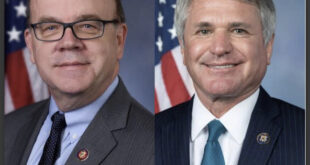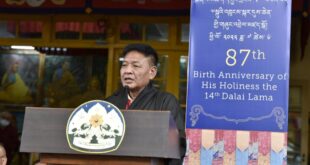By Lobsang Sangay
The Washington Post |Post Opinions
Published on November 3, 2011
Eleven Tibetans have set fire to themselves in eastern Tibet since March. Six have died. The Chinese government describes them as “terrorists in disguise.”
The reality is that their desperate acts were a scathing indictment of the People’s Republic of China’s rule in occupied Tibet. They highlight the dramatic struggle for survival as a people with a unique culture and identity.
Tibetans in exile have reacted to the pain and suffering inside Tibet, particularly in the Ngaba and Karze areas, where most of these self-immolations have occurred, with horror and anxiety. The monks and nuns who immolated themselves were sacrificing their bodies to draw the world’s attention to Chinese repression in Tibet.
The immolators acted on behalf of Tibet and the Tibetan people, and their intention was to harm no one else. This painful and sad action emerges from their anguish; they live in a climate of fear and have no other means of expressing themselves.

The Tibetan leadership in exile does not encourage self-immolation or protests inside Tibet because China only responds with more repression. It also heaps blame on the protesters. Instead of dousing the fire, Chinese authorities beat the first immolator, who died partly because of those injuries.
His Holiness the Dalai Lama has consistently appealed to Tibetans not to resort to such desperate acts. In 2008, for example, His Holiness the Dalai Lama asked Tibetans to cease the hunger strikes they were staging in response to China’s repressive policies.
As Tibet’s political leader, I also have appealed to exiled Tibetans to end their unto-death hunger strikes because we need them to protect and preserve our cultural and national identity, and to ensure the strength of our movement worldwide.
We urge Tibetans in and outside our homeland to focus on secular and monastic education. Highly educated professionals and learned monks will provide the human resources and the capability to strengthen and sustain our movement.
We must focus on the cause of the recent tragedies: the continuing occupation of Tibet and the Chinese policies of political repression, cultural assimilation, economic marginalization, and environmental destruction.
China risks further escalation by tightening the measures that led to the protests. During and after the uprising of 2008, the Chinese government imposed undeclared martial law in Tibet and carried out harsh actions, particularly in monasteries. Following the death of 20-year Kirti monk Lobsang Phuntsog in March of this year, the authorities cracked down even more tightly in Ngaba, virtually occupying the monastery, banning religious ceremonies, and imprisoning and torturing an unknown number of monks. They even forbade possession of a photo of His Holiness the Dalai Lama.
In exile, we support those in Tibet who are on the front lines of protecting their religious and cultural integrity; we try to ensure that their voices are heard by the world community. On Oct. 19, we organized a day-long prayer and fast, in accordance with our Buddhist traditions, in solidarity with those who self-immolated. It is our responsibility make sure that that the calls those Tibetans for restoration of freedom are heard, and their sacrifices are not in vain.
It is clear that the root of the self-immolations is the continuing occupation of Tibet. His Holiness the Dalai Lama and the Tibetan administration are not the problem but the solution.
We urge the United Nations and the international community to send fact-finding delegations to Tibet and view the situation firsthand. Independent media and liberal Chinese intellectuals should also be allowed access. The international community must press the government of the People’s Republic ofChinato restore freedom and resolve the issue of Tibet through dialogue for the mutual benefit of the Tibetan and Chinese peoples.
The writer is Tibet’s Kalon Tripa, or prime minister, leader of the Tibetan government in exile.

